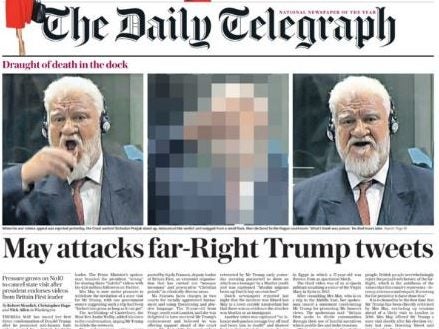
The BBC made an editorial decision not to show the moment a war criminal drank poison while in the dock at The Hague based on advice on reporting suicide from charity the Samaritans.
As well as abstaining from broadcasting the court footage, in which former Bosnian Croat general Slobodan Praljak can be seen drinking from a small vial and later telling the court that it was poison, the BBC also took steps to blur front page images of the moment in its newspaper round-up.
Both the Times and Telegraph ran an image of Praljak on their front pages, which were then blurred by the BBC in its The Papers blog.
Ethical constraints on reporting suicide feature in both the Ofcom Broadcasting Code, which governs the BBC, and the Editors’ Code of Practice, which the Times and Telegraph agree to abide by as members of the Independent Press Standards Organisation.
The Ofcom code states: “Methods of suicide and self-harm must not be included in programmes except where they are editorially justified and are also justified by the context.”
The Editors’ Code states: “When reporting suicide, to prevent simulative acts care should be taken to avoid excessive detail of the method used, while taking into account the media’s right to report legal proceedings.”
The incident was widely reported by the news media, having happened in full view of court cameras and officials.
A sentence of 20 years for war crimes was upheld against Praljak at the International Criminal Court yesterday hours before he died from ingesting the poison.
The BBC obscured the picture on The Times front page which shows the moment the general drank the poison.

Email pged@pressgazette.co.uk to point out mistakes, provide story tips or send in a letter for publication on our "Letters Page" blog
